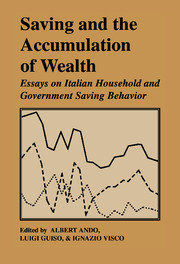Book contents
- Frontmatter
- Contents
- Foreword by Antonio Fazio
- List of contributors
- List of figures
- List of tables
- Acknowledgments
- Introduction
- I Saving trends, government deficit and demographic changes
- 1 Why is Italy's saving rate so high?
- 2 Private saving and the government deficit in Italy
- 3 Do demographic changes explain the decline in the saving rate of Italian households?
- 4 Generational accounting. The case of Italy
- II Life-cycle saving and precautionary motives
- III Borrowing constraints, intergenerational transfers and bequests
- Appendixes
- Index
4 - Generational accounting. The case of Italy
Published online by Cambridge University Press: 05 May 2010
- Frontmatter
- Contents
- Foreword by Antonio Fazio
- List of contributors
- List of figures
- List of tables
- Acknowledgments
- Introduction
- I Saving trends, government deficit and demographic changes
- 1 Why is Italy's saving rate so high?
- 2 Private saving and the government deficit in Italy
- 3 Do demographic changes explain the decline in the saving rate of Italian households?
- 4 Generational accounting. The case of Italy
- II Life-cycle saving and precautionary motives
- III Borrowing constraints, intergenerational transfers and bequests
- Appendixes
- Index
Summary
Introduction
Generational accounting is a new technique developed by Auerbach, Gokhale and Kotlikoff (1991) and Kotlikoff (1992) that can be used to study the effects on different generations of the government's fiscal policy. Generational accounting measures directly how much existing generations can be expected to pay, on net, to the government over their remaining lifetimes. The present value of the projected net payments by those now alive together with the government's net wealth and the present value of the projected net payments by future generations must cover the present value of government purchases/expenditures on goods and services. Generational accounting uses this equation – the government's intertemporal budget constraint – to infer the likely burden to be imposed on future generations. Specifically, generational accounting involves the projection of the present value of government spending, the calculation of the government's net wealth, and, as mentioned, the estimation of the present value of net payments to be made by current generations. The present value payments required of future generations is then determined as a residual.
Generational accounting represents an alternative to deficit accounting for purposes of understanding generational policy. Conventional deficit accounting has been criticized on a number of grounds including its failure to account for implicit government liabilities, its failure to adjust for inflation and growth, its failure to capture pay–as–you–go social security and related policies, and its neglect of policies that redistribute across generations through the change in the market price of assets.
- Type
- Chapter
- Information
- Saving and the Accumulation of WealthEssays on Italian Household and Government Saving Behavior, pp. 128 - 160Publisher: Cambridge University PressPrint publication year: 1994
- 8
- Cited by



